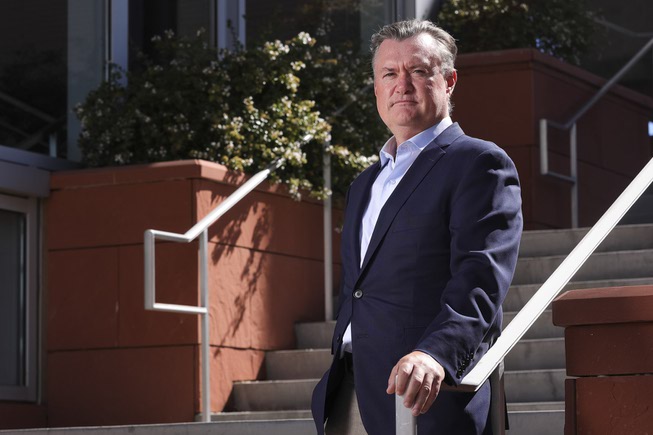
Robert R. Ulmer, Ph.D., Dean of the UNLV Greenspun College of Urban Affairs, poses for a photo at UNLV Wednesday, Oct. 4, 2023.
Wednesday, Oct. 11, 2023 | 2 a.m.
Las Vegas has a concert about every weekend, casino acts nightly, a rapidly growing sports scene and a New Year’s Eve celebration that shuts down the busiest and brightest road in Southern Nevada.
With November’s Formula One race and the Super Bowl in February, Las Vegas is only going to get busier, said Robert Ulmer, dean of the Greenspun College of Urban Affairs.
But with the new Tourist Safety Institute at UNLV, students and faculty will be able to find more ways to develop safety strategies for the massive events this city is known for hosting.
“We want to be an institute that is recognized worldwide — and has Nevada being recognized worldwide — as the thought leader in creating the most exciting, fun (and) innovative, but also the safest events, and that we take safety seriously,” Ulmer said.
The Tourist Safety Institute — housed under the Greenspun College of Urban Affairs — was given the green light with Gov. Joe Lombardo’s signing of Senate Bill 341 in June. The legislation appropriated $1 million in state funding over the next two years to the institute. The Nevada System of Higher Education’s Board of Regents gave its approval for the institute in September.
The concept has been in the minds of Ulmer and his team for about five or six years, he said. It will connect programs under the Greenspun College of Urban Affairs — like criminal justice, social work and journalism — with disciplines across the university, including the Schools of Medicine and Engineering and College of Liberal Arts, among others.
Criminal justice experts will look at tourist safety in terms of criminal activity, while social workers might look at concerns with public health — like intoxication or drug use, said William Sousa, professor in UNLV’s department of criminal justice.
These various insights are all important and necessary in creating top-tier tourist safety plans and research, Ulmer saod.
“We all approach safety from a slightly different perspective,” Sousa said. “And so, (since) tourist safety is really a multidisciplinary issue, and as a multidisciplinary issue, it makes sense that we take a multidisciplinary approach to the topic of tourism.”
The university already has coordinated with outside partners to help grow the institute, Ulmer said. Metro Police, the city of Las Vegas and resorts companies on the Strip will all contribute to the institute.
States like California have cornered the market on technology with the help of partnerships between state universities and private companies, and Ulmer sees UNLV doing the same for tourism.
He believes UNLV can become the world’s “thought leaders when it comes to creating the safest, most fun (and) most exciting tourist experiences in the world.” Ulmer said the institute was creating excitement among its various partners. “I think we understand, as a community and as a state, we need to be progressive; we need to be managing our own challenges, looking at ways to create the greatest opportunities (and) the most fun when it comes to tourism, but also create the safest environments possible for people when they come here.”
Students and faculty will have plenty of opportunities for community engagement and research, Ulmer said. Sousa said it’s still early for students to begin conducting work beneath the Tourist Safety Institute, but they will get their chance soon enough.
Some examples of the students’ opportunities range from doing surveys in the community about public safety to conducting research on how to create campaigns so people understand the warning signs of a possible shooting situation.
A few faculty members have done similar surveys regarding tourist safety on the Strip and Fremont Street in the past, and students were able to participate. They will do more of this work under the Tourist Safety Institute, Sousa said.
“So, there’s very much an opportunity for students to assist in gathering some of this information that will, again, help to inform the (safety) strategies going forward,” Sousa said.
Research from the institute can be used to create safer spaces for both tourists and locals, Sousa believes.
It’s also something that Ulmer says demonstrates the resiliency of Las Vegas and its residents. And the city is all too familiar with having to be resilient.
This month marked the sixth anniversary of the mass shooting on the Strip that left 58 immediately dead and around 800 others wounded — many of them visitors.
Many UNLV students at the time were affected by the tragedy. Now, they can use this institute as an “opportunity to make a difference” in the community and strengthen its resiliency, Ulmer said.
“I think the best communities in the world — and I think Nevada is one of those — looks at where it has its challenges and tries to address those in a proactive manner,” Ulmer said. “That doesn’t mean we’re going to prevent everything that can happen negatively in a community, but it says we’re taking extra steps, we are going above and beyond to ensure that we’re building resilience in our community.”
[email protected] / 702-948-7854 / @gracedarocha
